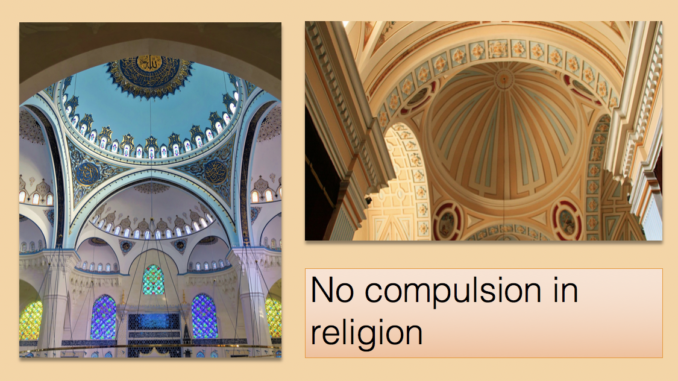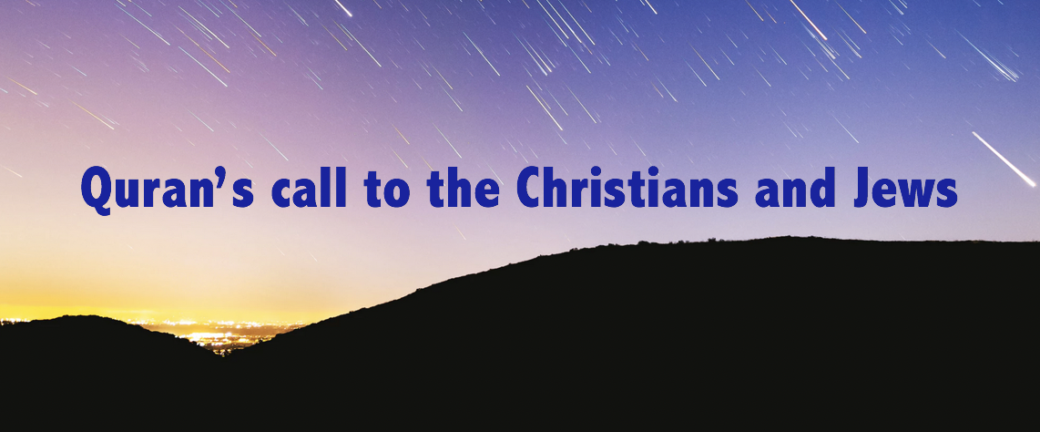
No coercion in religion
Prophet Muhammad (peace be on him) established a society in Madinah which was religiously diverse. Followers of different faiths practiced their religion freely and followed their own scriptures. As can be seen in history, Muslims did not intervene in this process, and there were no forced conversions. Consequently, Muslims, Jews, and Christians lived together with justice and religious harmony in Madinah. Prophet Muhammad (peace be upon him) followed the Quranic assertion that there was no coercion in the matter of religion. For this reason, Muslims, throughout time, view the society in Madinah as an example where diverse faith groups realized peaceful coexistence. https://qpeace.net/?p=1382
Pluralism is God’s design
The Quran states that Allah could have made all humanity one single community, yet He did not. As the Quran asserts, the objective of pluralism is to stimulate vibrant competition in good deeds between the faiths. This is the basis of religious pluralism in Islam.
“Quran: 5-48. “…We have assigned a divine law and an open way to each of you. If God had so willed, He would have made you one community. But He wanted to test you through which He has given you. So race to do good. You will all return to God, and He will make clear to you the matters you disputed.”
The universal message
It is important to realize that Muslims do not consider Islam to be God’s youngest new religion. Rather, they believe it is the continuation of God’s same universal religious message since the beginning of humanity. All the prophets and the messengers delivered the same universal truth of believing in One Creator, submission to Him, doing good towards others, and final accountability to their Maker. Muslims believe that Adam, Abraham, Ishmael, Moses, and Jesus (peace be on them all) are part of a chain of prophets sent by God to different nations at different times. Prophet Muhammad (peace be on him) was the last prophet of God in this prophetic chain. https://qpeace.net/?p=3159
“Quran 3:84. “….Say, “We believe in God, and in what was revealed to us, and in what was revealed to Abraham, and Ishmael, and Isaac, and Jacob, and their descendants; and in what was given to Moses, and Jesus, and the prophets from their Lord. We make no distinction between any of them, and to Him, we submit.”
Salvation is not exclusive to Muslims
The Quran does not claim the exclusivity of salvation for Muslims. To highlight this point, Kabir Helminski, an author, publisher, and writer, wrote: “…It is quite clear from many verses of the Qur’an that righteousness, morality, and one’s relationship with the Divine is not the exclusive possession of Muslims. Thus there seems to be a necessity to the diversity of religions, and this diversity may help us to understand our humanity and our relationship to God…”. https://www.huffpost.com/entry/according-to-the-quran_b_9102782
“Quran: 2:62. “Those who believe, and those who are Jewish, and the Christians, and the Sabeans—any who believe in God and the Last Day, and act righteously—will have their reward with their Lord; they have nothing to fear, nor will they grieve.”

People of the scriptures
To emphasize the special status of monotheistic Jews and Christians as the recipients of Divine revelation, the Quran describes them as “the people of the scripture.” It is important to realize that the Quran presents itself as the final revelation God sent to humanity, which verifies complements, and completes the previous revelations from God, including the Torah and the Bible.
“Quran 3:64. “…Say: O People of the Scripture! Come to a common term between us and you: that we shall worship none but God, and that we shall not ascribe a partner to Him, and that none of us shall take others for lords beside God. And if they turn away, then say Bear witness that we are they who have surrendered (unto Him).”
Restraint in the face of provocation
To understand the Quran’s militant verses, one truly needs to know the violent historical context of the time when those verses were revealed. Prophet Muhammad (peace be on him) and his followers were persecuted, mocked, and even killed by the pagans in Makkah. https://qpeace.net/?p=3120
Even in the face of this persecution, the Quran commanded Muslims not to speak disrespectfully to the pagan religious deities. The Quran recommends Muslims to show restraint and withdraw themselves from a discussion or a gathering engaged in ridiculing Islam or Quran.
“Quran 6:108. ” [Believers], do not insult those who they (nonbelievers) worship besides Allah in case they, in their hostility and ignorance, insult Allah. To each community, We make their own actions seem fair, but in the end, they will return to their Lord, and He will inform them of all they did.”
“Quran 6:68. “…..When you come across people who speak with scorn about Our revelations, turn away from them until they move on to another topic. If Satan should make you forget, then, when you have remembered, do not sit with those who are doing wrong.”
“Quran 4:140 “…if you hear people rejecting and ridiculing God’s revelation, do not sit with them unless they start to talk of other things, or else you yourselves will become like them…….”

Be the first to comment